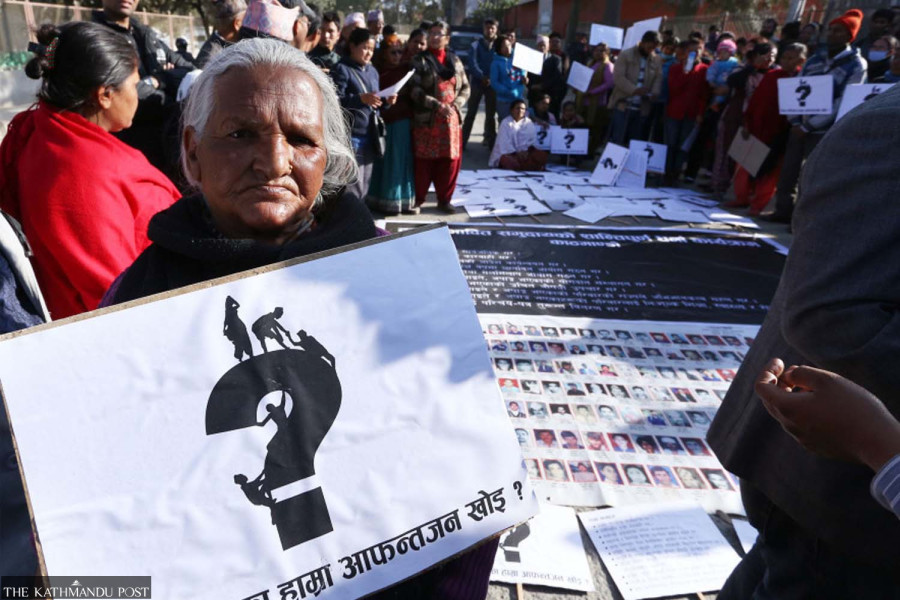National
With PM away, transitional justice bill loses momentum
Efforts to finalise the amendment bill have stalled as it could not be passed before Dahal’s trip to New York.
Binod Ghimire
Until a few weeks back, the government and the ruling parties appeared to show a sense of urgency towards finalising the amendment bill on the Enforced Disappearances Enquiry, Truth and Reconciliation Commission Act. While the Law, Justice and Human Rights Committee of the House of Representatives was in intense discussion, a series of talks were held among the top leaders of the major parties.
The ruling alliance, particularly Prime Minister Pushpa Kamal Dahal and his party CPN (Maoist Centre), had expedited negotiations as he, through the ongoing UN General Assembly meeting, wanted to give a message to the world that Nepal had amended the Act and was on course to conclude the transitional justice process soon.
However, with no sign of the bill’s endorsement before Dahal embarked on a journey to New York, the government’s efforts slowed down. And ever since the demise of Constituent Assembly chair and CPN-UML vice-chair Subas Chandra Nembang on September 12, there has been no discussion to finalise the bill. The sub-panel under the House committee which, on September 5, got a third one-week extension to finalise the bill, has yet to commence its work during this extended term.
“Not a single formal meeting has been held since the sub-committee got the latest extension,” Adhiraj Rai, secretary of the House Committee, told the Post. “As far as I know, there has as yet been no formal agreement among the parties.”
Lawmakers from various parties had reached a broad understanding on giving four years to the two transitional justice commissions—Truth and Reconciliation Commission, and Commission on the Investigation of Enforced Disappeared Persons—to complete their job, own up all complaints including those registered at the human rights committee of the United Nations and the National Human Rights Commission, among others.
“Though negotiations among different parties are heading in the right direction, there has been no agreement. Now it has been days we haven’t met,” Mahesh Bartaula, a UML whip who also is a member of the sub-panel, told the Post. “The ruling alliance hasn’t shown the urgency.”
Dahal left for New York on Saturday and is scheduled to address the general assembly on September 21, before embarking on a China visit from there. Bartaula said so far the sub-committee has held discussions with insurgency victims, human rights activists and lawmakers who have registered amendments to the bill.
Lawmakers from both the ruling and opposition parties have registered 27 amendments to the bill. Santosh Pariyar, chief whip of the Rastriya Swatantra Party, who also is a member of the sub-panel under the law and justice committee of Parliament, said there has been a broad understanding to have a victim-centric bill in place while also taking into account international standards and practices from various countries. A few months ago, a team of cross-party leaders led by the late Nembang had visited Colombia to study the South American nation’s successful transitional justice model.
“I believe we can finalise the bill with consensus if all parties are serious about concluding the process by taking it as a national responsibility. I don’t see many differences among the parties in principle,” Pariyar told the Post.
Lawmakers of the opposition parties say it is up to the government whether or not to finalise the bill. Bartaula said if the ruling parties agree to list murder of the non-armed people as serious violations of human rights, address the concerns of the child combatants used by the then CPN (Maoist) and issue of ‘war crimes and crimes against humanity’, it can be finalised shortly.
“All stakeholders claim the bill contradicts the Supreme Court’s order from 2015 as well as international standards. If the ruling parties agree to correct it, the bill can be endorsed unanimously without further delay,” he told the Post.
Bimala Subedi, chair of the House committee, said they are waiting for the sub-panel to submit its progress report. “The House committee will hold further discussions once the sub-panel sends the report. We are waiting for it,” she told the Post.
As there has been no progress in finalising the bill, the chances of it being endorsed in the current House session are slim, said an official at the Parliament Secretariat.
“The ongoing session is likely to be prorogued before the bill’s endorsement,” the official told the Post on condition of anonymity.




 13.12°C Kathmandu
13.12°C Kathmandu














